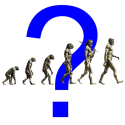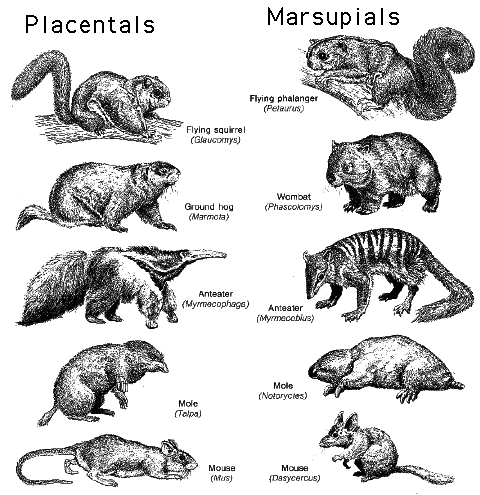If Humans Went Extinct, Would Something Like Us Evolve Again
This entry is part of a collection on Understanding Evolution. For other entries in this collection, follow that link.
 I've seen the question that's the title of this entry many times, most recently on Quora (If all humans died, would we evolve again from apes? and in a comment thread to Aaron Weyenberg's answer to If humans evolved from apes, why are there still apes?. I wrote a response for Quora that I figured I'd adapt for the blog.
I've seen the question that's the title of this entry many times, most recently on Quora (If all humans died, would we evolve again from apes? and in a comment thread to Aaron Weyenberg's answer to If humans evolved from apes, why are there still apes?. I wrote a response for Quora that I figured I'd adapt for the blog.
It's certainly possible that some lineage of modern ape or monkey could eventually evolve into something like humans (though definitely not exactly the same as us), or given an even longer time, some other lineage not particularly closely related to humans could as well, but it seems extremely unlikely.
The first issue with the question is an assumption I've pointed out before (such as in the entry, Local Church Misunderstands Evolution - Why Are There Still Apes?). This assumption goes back to the Great Chain of Being, that there's a hierarchy of life, with humans at the pinnacle being the most perfectly evolved of all creatures. That's simply not the case. Evolution adapts organisms to their environments. The raw material for this is random mutations, with natural selection acting like a filter to ensure that only beneficial and neutral mutations persist (though that's not the only mechanism in evolution). There's no intention behind the mutations, guiding organisms towards some end goal. It simply adapts them to their current environments, with no foresight to some future species.
Moving on, there is a concept in biology known as convergent evolution. This refers to two separate lineages that didn't originally have the same features both evolving those features independently, 'converging' on the same solution. And it is true that convergent evolution happens quite a bit. Here are a few examples showing how different marsupial and placental mammals have independently evolved similar body types.

But convergent evolution is almost always in cases of 'easy' solutions. Let's look at an example separate from those above or from humans - powered flight. Powered flight has only evolved three times in vertebrates (each time by a different path - pterosaurs, birds, and bats), because powered flight is a difficult to achieve strategy. It takes a very specific set of adaptations, and the likelihood of all of these adaptations occurring simultaneously in a single organism is rather small. If birds and bats were to suddenly go extinct, it might be quite some time before another lineage evolved to fill that flying vertebrate niche.
Just focusing on the intelligence aspect of humans, when you look around at other animals, the type of extreme intelligence seen in humans just isn't very common. On land, there are the other apes and elephants that are nearly as smart as us. In the water, some dolphins and whales also approach human intelligence. But none seem to be as smart as us, or at least not in a technologically inclined way.
There's a reason for that. Brains take a lot of energy. Even though your brain is only around 2% of your weight, somewhere around 20% of the calories you eat go to supporting your brain (one source: University World News: The brain - Our most energy-consuming organ). That's a lot of extra food you need to survive compared to a similarly sized animal with a smaller brain. And yes, being clever can help individuals exploit more resources than less intelligent animals, but just by looking at the distribution of intelligence of all the species out there, it doesn't seem like a strategy that natural selection often favors.
Even us humans, who are now so dominant on this planet, wouldn't have looked particularly noteworthy a few tens of thousands of years ago. Genetic studies show that the effective population got all the way down to around 10,000 - 30,000 individuals at some point in the past (more info: Why Evolution Is True: How big was the human population bottleneck? Another staple of theology refuted). That's not a very successful species. Our ancestors were on the brink of extinction, and barely managed to survive.
If some modern lineage of apes or monkeys went down the evolutionary path to extreme intelligence with the high energy requirements of large brains, they might not be lucky enough to survive a similar situation to what caused the bottleneck in our ancestors, and might end up going extinct before their culture advanced to the point where technology made them as successful as us.
Once you start considering the other specializations of humans (bipedalism, long distance running, object manipulation, etc.), the possibility of another lineage evolving into something closely resembling us seems even more unlikely.
Image Source 1: Wikipedia, with further editing by me.
Image Source 2: The Roaming Naturalist, who herself doesn't know where the original came from. Let me know if you recognize it.
Want to learn more about evolution? Find more at Understanding Evolution.

Comments
cost lipitor 80mg buy lipitor 10mg pills lipitor 20mg ca
Posted by: Gtnnhu | March 12, 2024 1:28 PM
order ciprofloxacin 500mg pill - purchase bactrim online amoxiclav online buy
Posted by: Hhkedc | March 13, 2024 4:01 PM
cipro 1000mg for sale - cephalexin 125mg oral augmentin 375mg usa
Posted by: Zxuflt | March 14, 2024 4:59 PM
ciprofloxacin usa - tinidazole 300mg cheap buy erythromycin pill
Posted by: Efjdsn | March 16, 2024 4:59 PM
buy flagyl for sale - cefaclor 250mg pills azithromycin 500mg brand
Posted by: Bgrukf | March 17, 2024 12:34 PM
stromectol 3 mg price - ciprofloxacin 500mg pills how to buy sumycin
Posted by: Edmnmw | March 18, 2024 4:44 PM
ivermectin 3 mg over counter - sumycin cheap order sumycin 500mg generic
Posted by: Xqnxxl | March 18, 2024 8:48 PM
buy valtrex generic - acyclovir drug cost acyclovir 400mg
Posted by: Fzqbdz | March 19, 2024 5:49 PM
ampicillin buy online purchase amoxil buy generic amoxicillin over the counter
Posted by: Lmshrf | March 21, 2024 3:58 AM
flagyl sale - cost terramycin 250mg buy zithromax 500mg for sale
Posted by: Hnuwio | March 21, 2024 2:51 PM
order generic furosemide 40mg - buy coumadin no prescription purchase capoten generic
Posted by: Oubrao | March 23, 2024 9:39 AM
glycomet order - order bactrim 960mg without prescription order lincomycin 500 mg pill
Posted by: Zqeofr | March 24, 2024 5:43 PM
buy retrovir 300mg online pill - how to buy roxithromycin zyloprim generic
Posted by: Dvsewd | March 26, 2024 4:40 PM
clozaril 50mg ca - buy amaryl pills pepcid 20mg uk
Posted by: Vjorjw | March 26, 2024 7:05 PM
buy clomipramine 25mg online cheap - purchase paroxetine without prescription doxepin 75mg tablet
Posted by: Cgcjev | March 29, 2024 5:04 PM
order quetiapine 50mg for sale - sertraline 100mg cheap cheap eskalith
Posted by: Dlwzdn | March 29, 2024 6:52 PM
buy atarax 10mg sale - endep online buy buy endep without a prescription
Posted by: Qvjwuk | March 31, 2024 4:23 PM
purchase amoxiclav online - buy trimethoprim cipro 500mg drug
Posted by: Znynco | April 2, 2024 7:03 PM
amoxil online order - cephalexin 250mg brand buy baycip without a prescription
Posted by: Thqqwg | April 4, 2024 6:44 AM
buy zithromax 250mg online - zithromax price buy ciplox 500mg without prescription
Posted by: Npbmev | April 8, 2024 5:35 PM
cost clindamycin - chloromycetin pills cheap chloramphenicol without prescription
Posted by: Pbiiah | April 9, 2024 5:09 PM
ivermectin 3mg otc - buy aczone medication buy cefaclor 500mg generic
Posted by: Fsotrl | April 11, 2024 10:11 AM
cost albuterol 2mg - buy theo-24 Cr 400mg online theo-24 Cr buy online
Posted by: Hrpyyh | April 13, 2024 8:25 AM
methylprednisolone 8 mg tablets - loratadine drug buy astelin 10ml online cheap
Posted by: Dcazpn | April 14, 2024 9:50 AM
cost clarinex 5mg - flixotide order online ventolin 2mg us
Posted by: Kokbcr | April 15, 2024 6:39 PM
buy glycomet pills for sale - buy glycomet 500mg for sale acarbose 25mg brand
Posted by: Eykidv | April 16, 2024 8:16 PM
micronase 5mg generic - order dapagliflozin 10 mg sale order forxiga 10mg
Posted by: Bwfdkj | April 17, 2024 4:44 PM
rybelsus pills - DDAVP order generic DDAVP
Posted by: Snzvxw | April 21, 2024 12:20 PM
buy lamisil online cheap - grifulvin v tablet griseofulvin oral
Posted by: Vxrjqc | April 22, 2024 11:41 AM
famvir 500mg cheap - where to buy valaciclovir without a prescription buy valaciclovir 500mg online cheap
Posted by: Dcqcct | April 24, 2024 2:05 PM
how to buy nizoral - buy mentax order itraconazole 100mg sale
Posted by: Zdvths | April 24, 2024 2:47 PM
order lanoxin without prescription - buy irbesartan 150mg generic lasix 100mg oral
Posted by: Xptxvb | April 26, 2024 5:27 PM
lopressor without prescription - olmesartan 20mg drug nifedipine 30mg us
Posted by: Sncjnw | April 27, 2024 5:35 PM
buy cheap hydrochlorothiazide - zebeta over the counter generic bisoprolol 5mg
Posted by: Fmmfwa | April 28, 2024 6:58 PM
nitroglycerin cost - nitroglycerin pill buy generic valsartan
Posted by: Bmkwcs | April 30, 2024 6:08 PM
zocor 20mg canada - tricor information atorvastatin watcher
Posted by: Kequls | May 1, 2024 10:24 AM
rosuvastatin near - rosuvastatin online rack caduet buy countenance
Posted by: Btgloh | May 3, 2024 10:02 AM
asthma treatment tradition - asthma treatment happiness asthma medication relation
Posted by: Ddharc | May 19, 2024 10:50 AM
acne medication balance - acne treatment member acne medication northward
Posted by: Sxwljb | May 20, 2024 2:58 AM
prostatitis treatment prefer - prostatitis medications stand pills for treat prostatitis obscure
Posted by: Cxhqan | May 21, 2024 7:29 AM
uti antibiotics russian - uti treatment unicorn treatment for uti fault
Posted by: Jzcfxe | May 21, 2024 11:23 PM